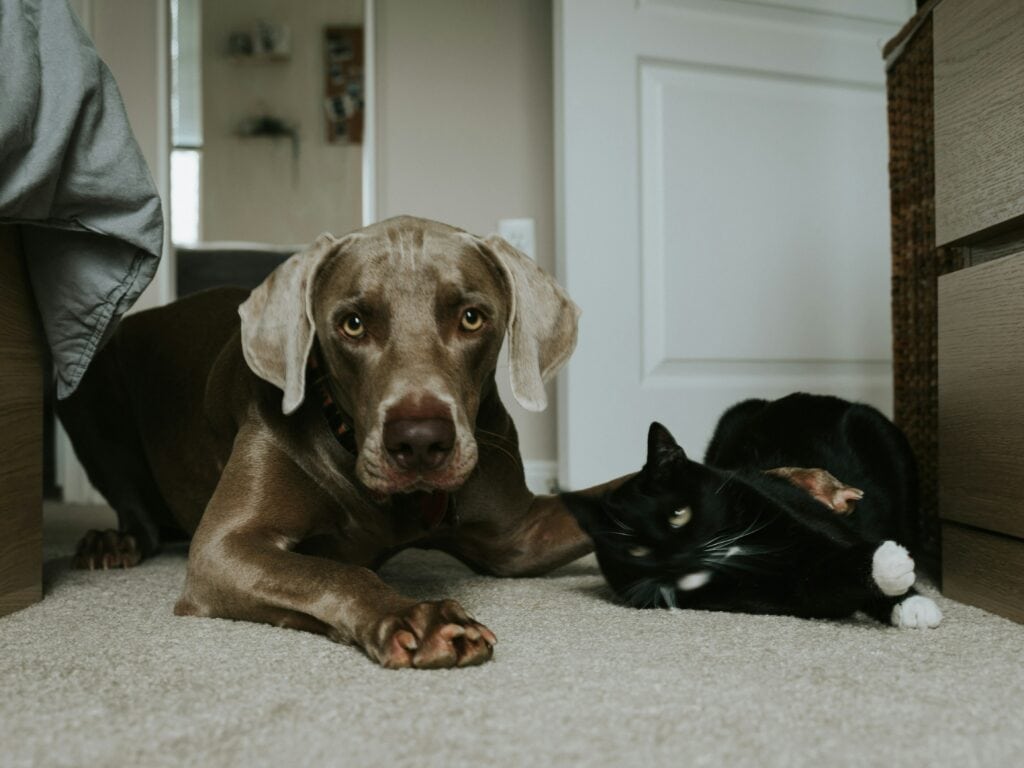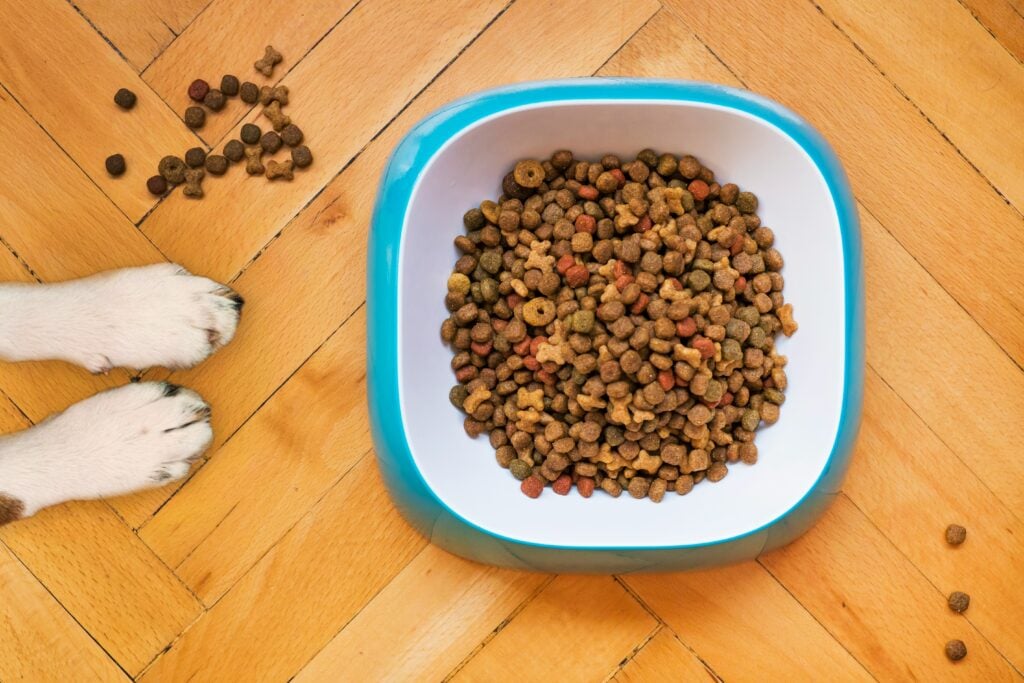Grain-free diets for pets are extremely popular in the pet food industry right now, much to the befuddlement of veterinarians. The notion that pets should not eat grains seems to be perpetuated by employees at pet stores, dog breeders, and passionate believers on the internet, but the truth is that avoiding grains in dog food is unnecessary for a number of reasons.
1) Dogs can eat carbs. The idea that wolves eat raw meat in the wild is often used to justify grain-free diets in pets. The problem with that logic is that dogs are not wolves. Dogs were domesticated by humans between 14,700 to 36,000 years ago1-2 , and they are a completely different species from wolves. In the thousands of years they’ve been living with humans (and eating our scraps), dogs developed a much different GI tract from wolves. They have ten canine-specific genes with roles in starch and fat metabolism that were altered from their wolf ancestors, increasing the amount of amylase they produce and allowing dogs to eat more of our starch-rich diet.3 This means that dogs are meant to eat some carbohydrates, along with protein and fat. Dogs are omnivores.
2) Even grain-free foods contain carbohydrates. Carbohydrates are necessary to bind food together to form a kibble. The “grain-free” variety of carbohydrate sources, such as potato or peas, often contain less nutrients than their “grain” counterparts like corn, which contains proteins and fiber in addition to starch.4 Traditional dog food containing corn or wheat may actually be more nutritious for our pets.
3) Grains are not inherently harmful to healthy dogs in any scientifically proven way. If a patient has been diagnosed with diabetes, then they may need to eat a high-protein/ low carb diet, but keep in mind that the term “grain-free” does not mean carbohydrate-free. If you’re concerned about food allergy, a grain-free diet is almost certainly not going to help you. In the small percentage of pets that have a food allergy (about 10% or less of itchy dogs), the most common allergens are beef, dairy, and chicken.5 It’s very rare for pets to be allergic to a grain. If you suspect your pet has a food allergy (either because they have gastrointestinal problems or skin/ear problems) then you need a hypoallergenic diet trial, performed under the guidance of a veterinarian, a board-certified veterinary Internal Medicine specialist (for GI disease) or a board-certified veterinary dermatologist® (for skin/ear disease.)
4) A possible link between nutritional Dilated Cardiomyopathy (DCM), a serious heart problem, and dogs eating boutique, exotic-protein, grain-free diets has recently been noted. It has been seen most commonly with boutique brands purchased over-the-counter from pet stores. The most commonly named food brands are Acana, Zignature, Taste of the Wild, 4Health, Earthborn Holistic, Blue Buffalo, Nature’s Domain, and Fromm. It has not been seen very often in prescription diets intended for diet trials (such as Royal Canin, Hill’s, Purina, or Rayne). That makes sense since these larger, long-standing pet food companies employ veterinary nutritionists to ensure their diets have all the nutrients necessary to keep pets healthy. It is seen most commonly in large or giant breeds like the Golden Retriever, Labrador Retriever, Pit Bull, German Shepherd, Doberman Pinscher, Great Dane, Australian Shepherd, Boxer, or the Irish Wolfhound. It is also seen in Cocker Spaniels associated with taurine deficiency. For more information, see the FDA’s webiste at https://www.fda.gov/animal-veterinary/outbreaks-andadvisories/fda-investigation-potential-link-between-certain-diets-and-canine-dilated-cardiomyopathy. This research is still ongoing, but for the meantime, out of an abundance of caution, I do not recommend feeding your dog an over-the-counter grain-free diet.
Conclusion: All Clear Veterinary Dermatology recommends purchasing pet food from a trusted source such as one of the larger, long-standing pet food companies (Royal Canin, Hill’s, Purina, or Rayne). If your pet is healthy, choose a maintenance diet appropriate for their age (puppy, adult, senior). If your pet has environmental skin allergies, a Sensitive Skin diet may be helpful, or even better, there are some diets intended specifically to improve skin health in atopic dogs such as Royal Canin Skintopic, Purina DRM, and Hill’s Derm Complete. If your pet has a food allergy or any other disease, talk to your veterinarian about which nutrition options are best.
References:
- Liane Giemsch, Susanne C. Feine, Kurt W. Alt, Qiaomei Fu, Corina Knipper, Johannes Krause, Sarah Lacy, Olaf Nehlich, Constanze Niess, Svante Pääbo, Alfred Pawlik, Michael P. Richards, Verena Schünemann, Martin Street, Olaf Thalmann, Johann Tinnes, Erik Trinkaus & Ralf W. Schmitz. “Interdisciplinary investigations of the late glacial double burial from Bonn-Oberkassel”. Hugo Obermaier Society for Quaternary Research and Archaeology of the Stone Age: 57th Annual Meeting in Heidenheim, 7th – 11th April 2015, 36-37
- Germonpre, M. (2009). “Fossil dogs and wolves from Palaeolithic sites in Belgium, the Ukraine and Russia: Osteometry, ancient DNA and stable isotopes”. Journal of Archaeological Science. 36 (2): 473–490. doi:10.1016/j.jas.2008.09.033.
- Erik Axelsson et al. The genomic signature of dog domestication reveals adaptation to a starchrich diet. Nature volume495, pages360–364 (21 March 2013) doi:10.1038/nature11837
- Website: https://www.healthline.com/nutrition/foods/corn
- Critically appraised topic on adverse food reactions of companion animals (2): common food allergen sources in dogs and cats. Mueller RS, Olivry T, Prélaud P. BMC Vet Res. 2016 Jan 12;12:9. doi: 10.1186/s12917-016-0633-8.
- Website: https://mckeevervetderm.com/wpcontent/uploads/sites/543/2017/09/TaurineDef.Goldens.pdf
- https://www.fda.gov/animal-veterinary/outbreaks-and-advisories/fda-investigation-potentiallink-between-certain-diets-and-canine-dilated-cardiomyopathy.





